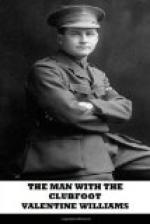“Of the whole four of us I was the only one to reach our objective. There I drew blank. The letter was not in the hiding-place indicated. I think it never had been or the Huns would have got it. I felt all the time that they didn’t know exactly where the letter was but that they anticipated our attempt to get it, hence the unceasing vigilance all along the frontier and inside it, too.
“They damned nearly got me at Cleves: I escaped as by a miracle, and the providential thing for me was that I had never posed as anything but a German, only I varied the type I represented almost from day to day. Thus I left no traces behind or they would have had me long since.”
The sadness in my brother’s voice increased and the shadows deepened in his face.
“Then I tried to get out,” he continued. “But it was hopeless from the first. They knew they had one of us left in the net and they closed every outlet. I made two separate attempts to cross the line back into Holland, but both failed. The second time I literally had to flee for my life. I went straight to Berlin, feeling that a big city, as remote from the frontier as possible, was the only safe hiding-place for me as long as the hue and cry lasted.
“I was in a desperate bad way, too, for I had had to abandon the last set of identity papers left to me when I bolted. I landed in Berlin with the knowledge that no roof could safely shelter me until I got a fresh lot of papers.
“I knew of Kore—I had heard of him and his shirkers’ and deserters’ agency in my travels—and I went straight to him. He sent me to Haase’s ... this was towards the end of June. It was when I was at Haase’s that I sent out that message to van Urutius that fell into your hands. That happened like this.
“I was rather friendly with a chap that frequented Haase’s, a man employed in the packing department at the Metal Works at Steglitz. He was telling us one night how short-handed they were and what good money packers were earning. I was sick of being cooped up in that stinking cellar, so, more by way of a joke than anything else, I offered to come and lend a hand in the packing department. I thought I might get a chance of escape, as I saw none at Haase’s. To my surprise, Haase, who was sitting at the table, rather fancied the idea and said I could go if I paid him half my wages: I was getting nothing at the beer-cellar.
“So I was taken on at Steglitz, sleeping at Haase’s and helping in the beer-cellar in the evenings. One day a package for old van Urutius came to me to be made up and suddenly it occurred to me that here was a chance of sending out a message to the outside world. I hoped that old van U., if he tumbled to the ‘Eichenholz,’ would send it to you and that you would pass it on to my Chief in London.”
“Then you expected me to come after you?” I said.




